Sir John Monash, Personal Files Book 5, 25 May - 10 June 1915, Part 11
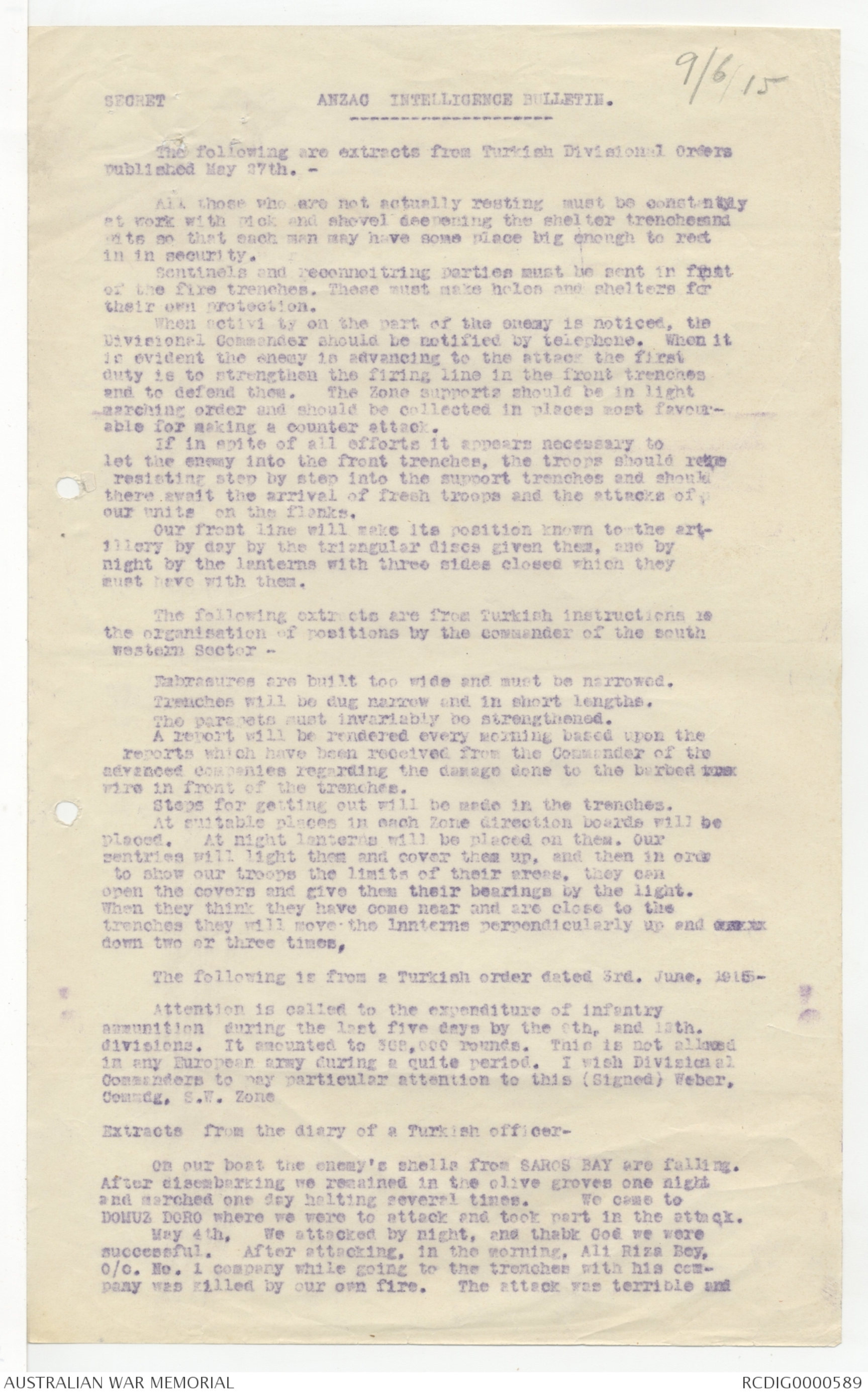
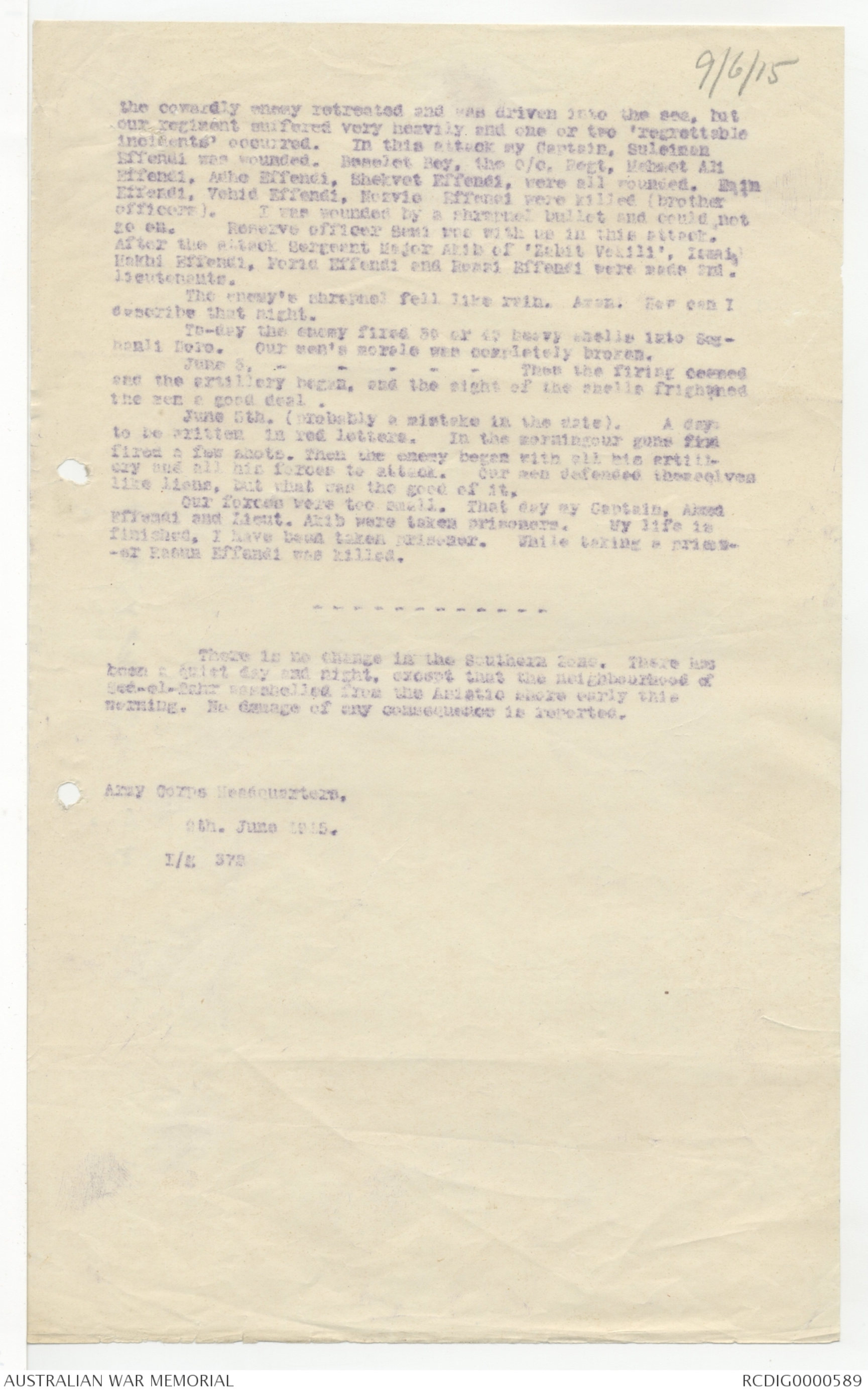
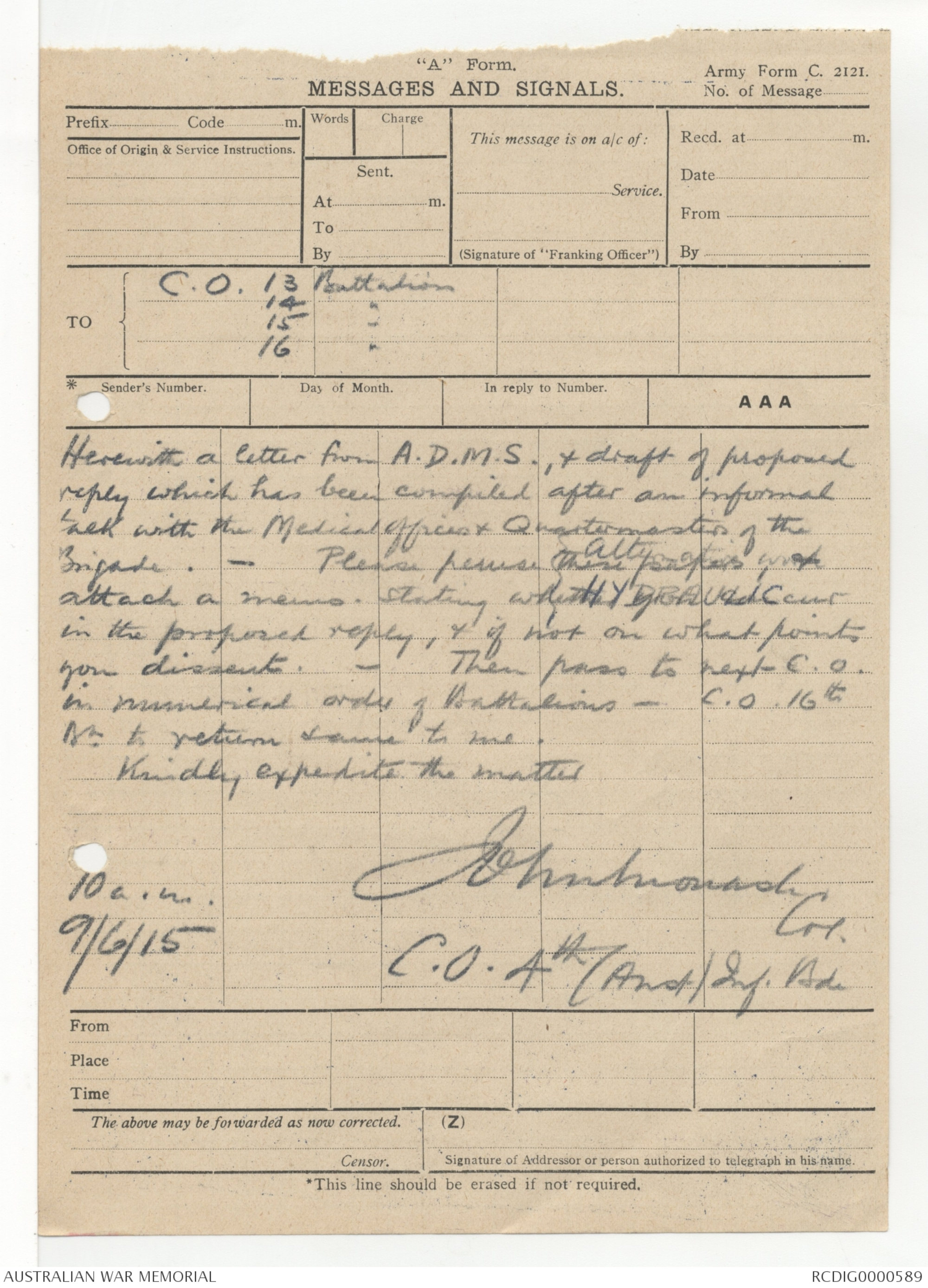
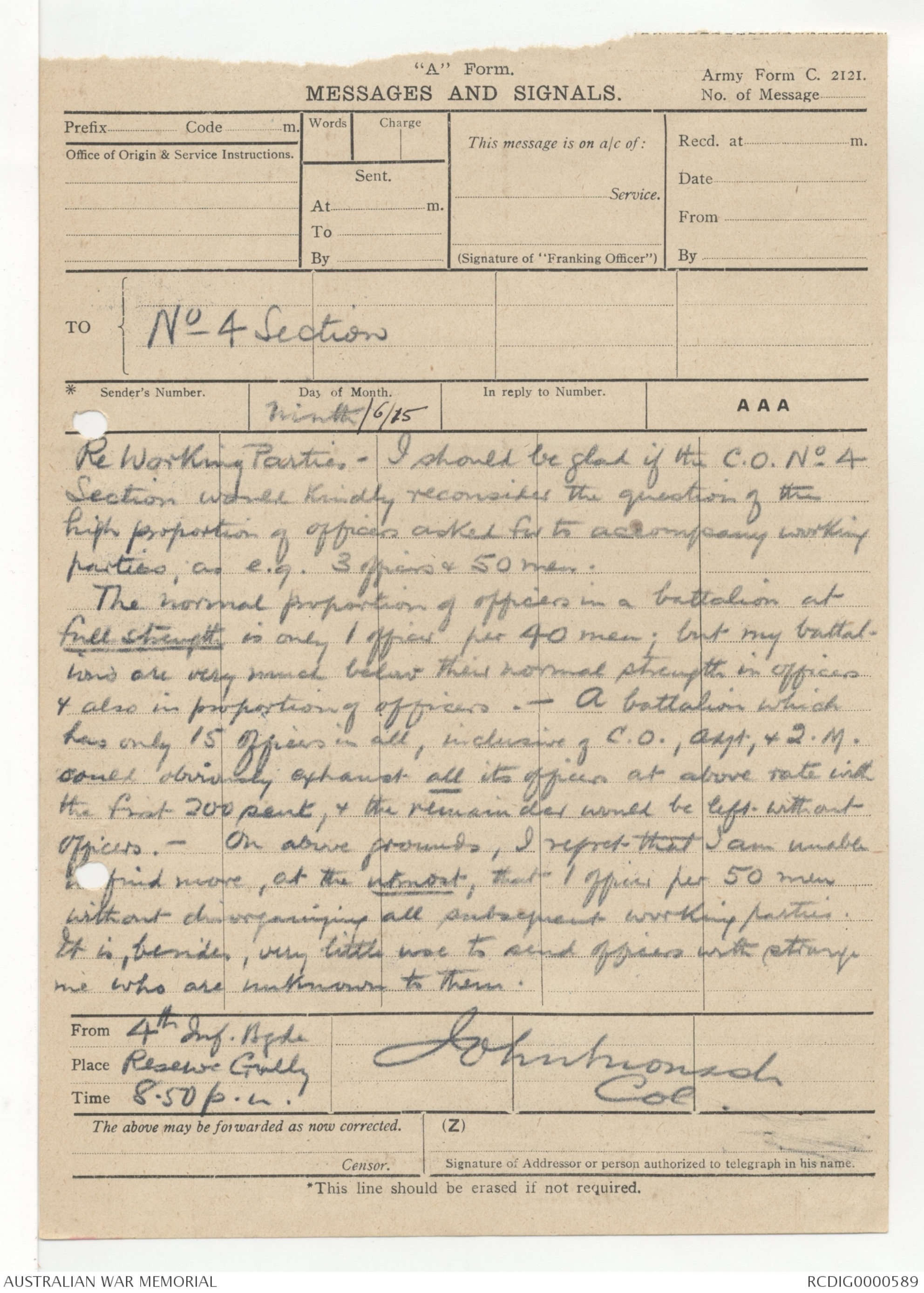
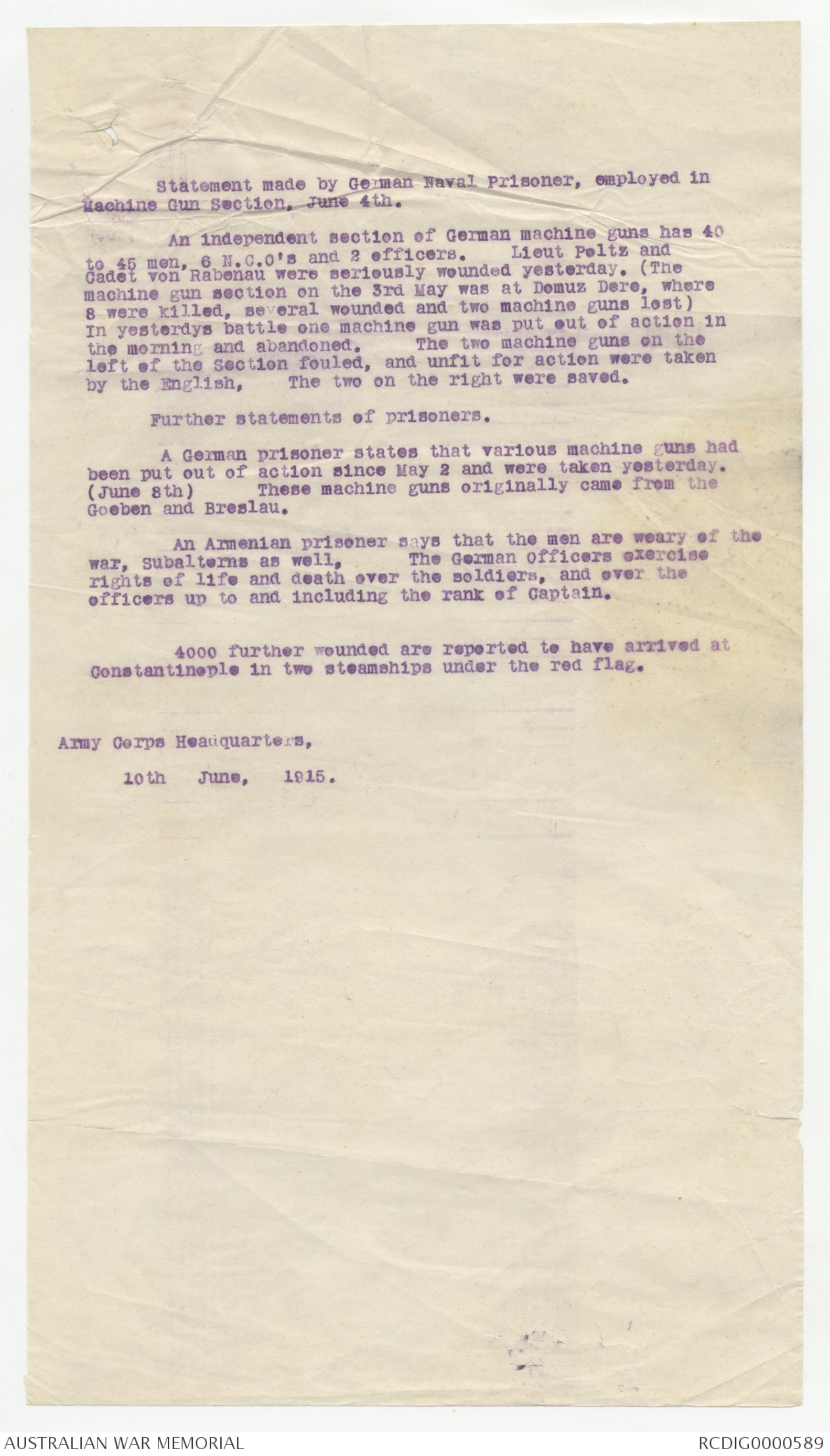
SECRET ANZAC INTELLIGENCE BULLETIN. 9/6/15
The following are extracts from Turkish Divisional Orders
published May 27th.-
All those who are not actually resting must be constantly
at work with pick and shovel deepening the shelter trenches and
pits so that each man may have some place big enough to rest
in in security.
Sentinels and reconnoitring parties must be sent in front
of the fire trenches. These must make holes and shelters for
their own protection.
When activity on the part of the enemy is noticed, the
Divisional Commander should be notified by telephone. When it
is evident the enemy is advancing to the attack the first
duty is to strengthen the firing line in the front trenches
and to defend them. The Zone supports should be in light
marching order and should be collected in places most favourable
for making a counter attack.
If in spite of all efforts it appears necessary to
let the enemy into the front trenches, the troops should [[retire?]]
resisting step by step into the support trenches and should
there await the arrival of fresh troops and the attacks of
our units on the flanks.
Our front line will make its position known to the artillery
by day by the triangular discs given them, and by
night by the lanterns with three sides closed which they
must have with them.
The following extracts are from Turkish instructions in
the organisation of positions by the commander of the south
western sector -
Fabrasures are built too wide and must be narrowed.
Trenches will be dug narrow and in short lengths.
The parapets must invariably be strengthened.
A report will be rendered every morning based upon the
reports which have been received from the Commander of the
advanced companies regarding the damage done to the barbed win
wire in front of the trenches.
Steps for getting out will be made in the trenches.
At suitable places in each Zone direction boards will be
placed. At night lanterns will be placed on them. Our
sentries will light them and cover them up, and then in order
to show our troops the limits of their areas, they can
open the covers and give them their bearings by the light.
When they think they have come near and are close to the
trenches they will move the lanterns perpendicularly up and xxxxx
down two or three times,
The following is from a Turkish order dated 3rd. June. 1915 -
Attention is called to the expenditure of infantry
ammunition during the last five days by the 9th, and 13th.
divisions. It amounted to 368,000 rounds. This is not allowed
in any European army during a quite period. I wish Divisional
Commanders to pay particular attention to this (Signed) Weber,
Commdg, S.W. Zone
Extracts from the diary of a Turkish officer -
On our boat the enemy's shells from SAROS BAY are falling.
After disembarking we remained in the olive groves one night
and marched one day halting several times. We came to
DOMUZ DORO where we were to attack and took part in the attack.
May 4th. We attacked by night, and thank God we were
successful. After attacking, in the morning, Ali Riza Bey,
O/c. No. 1 company while going to the trenches with his company
was killed by our own fire. The attack was terrible and
9/6/15
the cowardly enemy retreated and was driven into the sea, but
our regiment suffered very heavily and one or two 'regrettable
incidents' occurred. In this attack my Captain, Suleiman
Effendi was wounded. Baselet Bey, the O/c Regt, Mehmet Ali
Effendi, [[Asihe]] Effendi, Shekvet Effendi, were all wounded. Eqin
Effendi, Vehid Effendi, Nozvic Effendi were killed (brother
officers). I was wounded by a shrapnel bullet and could not
go on. Reserve Officer Semi was with me in this attack.
After the attack Sergeant Major Akib of 'Zebit Vekili', [[Zizal,]]
Hakbi Effendi, Ferid Effendi and Reazi Effendi were made 2nd.
Lieutenants.
The enemy's shrapnel fell like rain. [[A?an]] How can I
describe that night.
To-day the enemy fired 30 or 40 heavy shells into [[Seghanli]]
Dere. Our men's morale was completely broken.
June 3, " " " " " Then the firing ceased
and the artillery began, and the sight of the shells frightened
the men a good deal.
June 5th. (probably a mistake in the date). A day
to be written in red letters. In the morning our guns firi
fired a few shots. then the enemy began with all his artillery
and all his forces to attack. Our men defended themselves
like lions, but what was the good of it.
Our forces were too small. That day my Captain, Ahmed
Effendi and Lieut. Akib were taken prisoners. My life is
finished, I have been taken prisoner. While taking a prisoner
[[Ea??]] Efendi was killed.
- - - - - - - - - - - - -
There is no change in the Southern Zone. There has
been a quiet day and night, except that the neighbourhood of
[[See-el-Zahr]] was shelled from the Adriatic shore early this
morning. No damage of any consequence is reported.
Army Corps Headquarters.
8th. June 1915.
[[I?]]/M 372
"A" Form Army Form C. 2121.
MESSAGES AND SIGNALS. No. of Message...
TO C.O. 13 Battalion
14 "
15 "
16 "
Sender's Day of In reply
Number Month to Number
AAA
Herewith a letter from A.D.M.S., & draft of proposed reply which has been compiled after an informal talk with the Medical Officer & Quartermaster of the Brigade. - Please peruse these ∧alternative papers, & attach a memo. stating which HYDRAULIC {{cut?}} in the proposed reply, & if not on what points you dissent. - Then pass to next C.O. in numerical order of Battalions - C.O. 16th Bn. to return same to me.
Kindly expedite the matter.
John Monash
Col.
C.O. 4th (Aust/Inf. Bde.
10 a.m.
9/6/15
"A" Form Army Form C. 2121.
MESSAGES AND SIGNALS. No. of Message...
TO No. 4 Section
Sender's Day of In reply
Number Month to Number
Ninth/6/15 AAA
Re Working Parties - I should be glad if the C.O. No. 4 Section would kindly reconsider the question of this high proportion of officers asked for to accompany working parties, as e.g. 3 officers & 50 men.
The normal proportion of officers in a battalion at full strength is only 1 officer per 40 men; but my battalions are very much below their normal strengths in officers & also in proportion of officers. - A battalion which has only 15 officers in all, inclusive of C.O., Adjt., & 2.M. could obviously exhaust all its officers at above rate with the first 200 sent, & the remainder would be left without officers. - On above grounds, I regret that I am unable to find more, at the utmost, that 1 officer per 50 men without disorganizing all subsequent working parties. It is, besides, very little use to send officers with strange men who are unknown to them.
From 4th Inf. Bgde
Place Reserve Gully
Time 8.50 p.m.
John Monash
Col.
Statement made by German Naval Prisoner, employed in Machine Gun Section, June 4th.
An independent section of German machine guns has 40 to 45 men, 6 N.C.O's and 2 officers. Lieut Peltz and Cadet von Rabenau were seriously wounded yesterday. (The machine gun section on the 3rd May was at Demuz Dere, where 8 were killed, several wounded and two machine guns lost)
In yesterdays battle one machine gun was put out of action in the morning and abandoned. The two machine guns on the left of the section fouled, and unfit for action were taken by the English. The two on the right were saved.
Further statements of prisoners.
A German prisoner states that various machine guns had been put out of action since May 2 and were taken yesterday. (June 8th) These machine guns originally came from the Goeben and Breslau.
An Armenian prisoner says that the men are weary of the war, subalterns as well. The German officers exercise rights of life and death over the soldiers, and over the officers up to and including the rank of Captain.
4000 further wounded are reported to have arrived at Constantinople in two steamships under the red flag.
Army Corps Headquarters,
10th June, 1915.
 D Coates
D CoatesThis transcription item is now locked to you for editing. To release the lock either Save your changes or Cancel.
This lock will be automatically released after 60 minutes of inactivity.